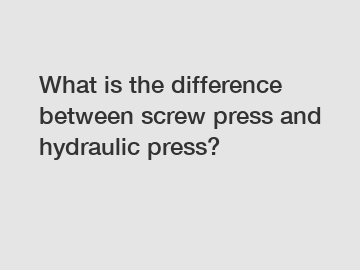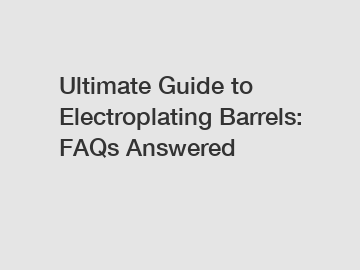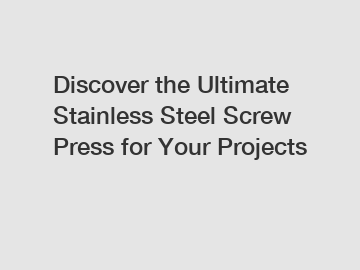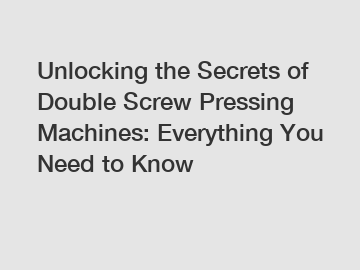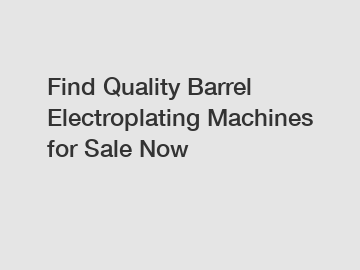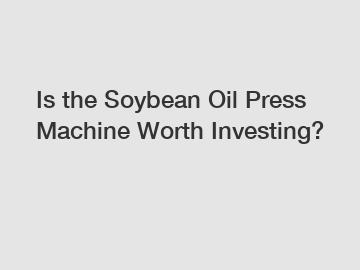Choosing the Right Press Machine for Your Manufacturing Needs
Choosing the right press machine is crucial for any manufacturing process. With a myriad of options available in the market, it can be overwhelming to make the right choice that aligns with your specific manufacturing needs. This article will guide you through the essential factors to consider when selecting a press machine and highlight key considerations that will help you make an informed decision. Whether you are looking for a press machine for metal stamping, forging, or any other manufacturing application, understanding these factors and considerations will ensure optimal performance, efficiency, and cost-effectiveness. From the type of press machine to its capacity, speed, and versatility, we will explore all the crucial aspects that should be taken into account. By the end of this article, you will have a clear understanding of what to look for in a press machine and be equipped to choose the right one that meets your manufacturing needs.
Factors to Consider When Choosing a Press Machine
When it comes to choosing a press machine, there are several factors that need to be considered. This piece of equipment plays a crucial role in various industries, including manufacturing, printing, and metalworking. Therefore, making the right choice is essential for the efficiency and productivity of your operations.
First and foremost, it is important to consider the type of press machine that best suits your needs. There are different types available, such as mechanical, hydraulic, and pneumatic presses. Each type has its own advantages and disadvantages, so understanding your specific requirements is crucial. Mechanical presses, for example, are known for their high speed and precision, while hydraulic presses offer greater flexibility and control.
Another important factor to consider is the capacity of the press machine. This refers to the maximum force that the machine can exert. It is essential to choose a press machine that can handle the workload of your operations. Underestimating the required capacity can lead to inefficiencies and delays, while overestimating can result in unnecessary costs.
The size and dimensions of the press machine are also key considerations. You need to ensure that the machine fits comfortably in your workspace and allows for smooth operation. Additionally, you should consider the accessibility and ease of maintenance. A press machine that is difficult to access or requires complex maintenance procedures can significantly affect your productivity.
Furthermore, it is crucial to evaluate the safety features of the press machine. This includes features such as emergency stop buttons, safety guards, and overload protection systems. Ensuring that the machine meets the necessary safety standards is essential to protect your employees and prevent accidents.
Lastly, consider the reputation and reliability of the manufacturer. Look for a reputable company with a track record of producing high-quality press machines. Reading customer reviews and testimonials can provide valuable insights into the performance and durability of the machines.
Key Considerations for Press Machine Selection
When it comes to selecting a press machine, there are several key considerations that need to be taken into account. Press machines are an essential tool in many industries, and choosing the right one can greatly impact productivity and efficiency.
One important factor to consider is the type of press machine needed for the specific application. There are various types available, such as hydraulic presses, mechanical presses, and pneumatic presses. Each type has its own advantages and disadvantages, so it is crucial to determine which one is best suited for the intended use. Factors to consider include the required force, speed, and precision of the machine.
Another consideration is the size and capacity of the press machine. The size of the machine should be determined based on the available space in the facility and the size of the parts or materials that need to be processed. It is important to choose a press machine that can handle the expected workload without overloading or causing excessive wear and tear.
Related articles:Machinery
Fix Bluetooth problems in Windows
Advantages of Sheet Metal Laser Cutting Machine
Demystifying the Functionality of Metal Crushers
Electric Dump Trucks Vs. Diesel Dump Trucks
What Should You Know About Packaging Machinery?
5 Things to Know Before Buying Laser Machinery
Additionally, the safety features of the press machine should be carefully evaluated. Press machines can be dangerous if not used properly, so it is essential to choose a machine that has appropriate safety mechanisms in place. This may include features such as emergency stop buttons, safety guards, and interlocking systems to prevent accidental activation.
Furthermore, the cost and overall value of the press machine should be considered. It is important to find a balance between the initial investment and the long-term benefits that the machine can provide. Factors such as maintenance and repair costs, energy efficiency, and durability should all be taken into account when evaluating the value of a press machine.
Choosing the right press machine is a critical decision that requires careful consideration. Factors such as type, size, safety features, and overall value should be evaluated to make an informed decision. Press machines play a vital role in many industries and selecting the right one can greatly improve productivity and efficiency. Researching and evaluating different options is essential for long-term business success.
Press primarily represents a specified form of machine tool. It is essential for performing multiple industrial manufacturing procedures. This machine tool helps in delivering energy through force, which can act over a stroke or distance. One major application is going to be metal forging by the industrial manufacturing unit. The energy is used to close die and forging part within. These machine tools are used for applying force or energy to work in a different manner than drop hammers. Hammers are also part of machine tool but of a completely different kind. Forging is the only form of manufacturing process, which employs press.
More about the main machine:
The Press Machines are mainly used in sheet metal fabrication and metal extrusion processes and these are described to be primary machine tool. Mechanical and hydraulic presses are mainly added during formation of sheet metal. Presses are designed to be used in manufacturing multiple plastic parts. Some of the machining operations can further need the use of presses, such as in broaching.
Varying in size and force:
These presses tools are designed to vary in amount of force implied and size. The energy produced is often used to work on processes, which are in need of tremendous force. Some examples are large plastic deformation task of sizable metallic piece. Depending on the type of machine used, there will be a difference in nature and method of delivering energy.
Vertical presses are available:
You will come across vertical presses, as a type of machine. Here, the force vector is up and down, quite relative to the gravity. In some of the cases, these types are utilized in a horizontal manner. Here, the force is delivered in a perpendicular path to the direction of gravitational force. In case the force is exerted horizontally, vertically or in intermediate angle, then the working principles are same.
Two types are available:
In generic terms, Press Machines are available in two major types; mechanical presses and hydraulic presses. Depending on the manufacturing procedure, the machine press type varies. The first consideration has to be the basic process of such press tool. For example, the one used for extrusion will have different general requirements when compared to the tool, used for pressing a sheet metal working.
The next factor to consider is the press capacity needed. The required capacity is related to size of work stock and the process type.
Other primary factors to consider:
Stroke length, over which the press is going to deliver force, is another factor to consider while choosing a machine. This needs to be related to basic process type, which has been employed. Going through these initial considerations will provide you with generic idea on the type of presses available and required for your job. The specified factors of such manufacturing procedure need to be weighed for determining best press tool. Other than hydraulic and mechanical press, you can even consider checking out functionality of crank press. Go through the detailed functionality first before planning to invest money on one.
Tags: hydraulic press press machine vertical press
Choosing the Right Press Machine for Your Manufacturing Needs
Types Of Press Machines And Ways To Choose The Best One Among The Lot -
Further reading:Questions to Ask If You're Thinking of Buying a Laser Engraver
The Best Places to Buy high speed presses Online and In-Store
What was the first bulldozer?
How Does Pads Work?
Why is cutting machine Better?
Ultimate Guide to Energy Bar Forming Machine Price
Revolutionizing Industry Standards: Commercial Anodizing Equipment Upgrade?
- 0



